There is a decent short film about human connection buried within writer/director Ashley McKenzie’s overlong and exasperating, “Queens of the Qing Dynasty.” This Canadian filmmaker’s sophomore feature depicts the deep friendship that develops between the suicidal Star (Sarah Walker) and An (Ziyin Zheng), a genderqueer volunteer at the hospital where Star is being held (and not for the first time).
Star is admitted for drinking poison, and the staff tends to her, giving her activated charcoal to detoxify, followed by an endoscope. McKenzie’s camera also enters Star’s mouth and down her esophagus, which is unpleasant for anyone who does not find medical procedures entertaining. As Star meets with various kindly doctors who talk, test, and try to monitor her, she mostly prefers the company of An, who is on hand as her advocate and to ensure she does not do harm to herself or others.
The conversations between Star and An are the best scenes in the film. She tells An she is not gay, but asexual. An sings a Celine Dion song to Star and they have “fuzzy feelings.” It is a closed circuit, and viewers who sink into the agonizingly slow rhythm of “Queens of the Qing Dynasty” will appreciate the friendship they share. Others will be racing for the exit before the first reel is finished.
McKenzie favors tedious scenes that supposedly freight precious lines of dialogue with meaning. The soundtrack punctuates the many long silences with digital beeps and ethereal music.
Star likes to “speak what’s on her mind,” which An appreciates. An, however, is more fanciful, and tells Star, “I will be a housewife, and make you dinner. Will you be my husband?” An, who dreams of having a woman’s body, also expresses their desire to be like those women in porn films who have a group of men ejaculate all over them.
Star confesses something far more horrific, claiming that she had a baby, and her brother was the child’s father and its uncle. An acknowledges her trauma and states that the Queens of the Qing dynasty are full of such family drama.
These moments aside, McKenzie’s film, however, does not feature much in the way of drama. In one scene, Star bites and chews a zucchini. An extended episode has Star and An both playing with hospital food, making an inedible mess out of a dessert. This bonds the pair, but these scenes are overlong and pointless. Around the midpoint of “Queens of the Qing Dynasty,” Star is released from the hospital and set up to live in a motel owned by Russians. She is soon ejected for willfully breaking the rules and sent back to the hospital.
The lack of character development is both deliberate and frustrating. Star is played by Sarah Walker in a near-catatonic state that may be realistic, but it is rarely interesting. She mutters about never having seen Brown people, despite a South Asian hospital employee correcting her that they met the last time she was in the facility.
Star seems to connect with An because they are the sole person who does not want or expect anything from her. Her exchanges with her doctors are endurance tests, where she reluctantly participates in exercises or answers questions that can determine if she can be released. As An indicates, the Queens of the Qing dynasty play mental games to outwit men and protect themselves. There is a suggestion that Star is doing this, but that may, in fact, not be the case. She craves medication for her ADHD and has trouble focusing.
McKenzie is certainly commenting on mental health and what it means to be different in society — Star is neurodiverse — but “Queens of the Qing Dynasty” presents these issues without much insight. Star’s past, which apparently involves burning a house down, is revealed incrementally, but it is difficult to get a complete sense of her and her issues.
In contrast, An is an immigrant who hopes to become a resident. They have an option to marry to stay in the country. Star proposes marriage at one point, and she is fixated on the idea of a trophy wife. Star benefits from marrying An so she won’t be homeless. But the result of their conversation is, like much of “Queens of the Qing Dynasty,” fruitless. An finds a flaw in the marriage plan.
As An, Ziyin Zheng gives a delicate performance, and they are the sole reason to see the film. They talk about swaddling — McKenzie includes a montage of babies being swaddled — and one can understand An’s need to feel comforted and protected.
Much of “Queens of the Qing Dynasty” is raw and discomfiting. McKenzie’s perspective is admirable, but her ambitious film is ultimately obfuscating.
Ashley McKenzie will be in attendance at the 6:30pm screening on May 5.
“Queens of the Qing Dynasty” | Directed by Ashley McKenzie | Opening May 5 at the Metrograph | Distributed by Factory 25.



































